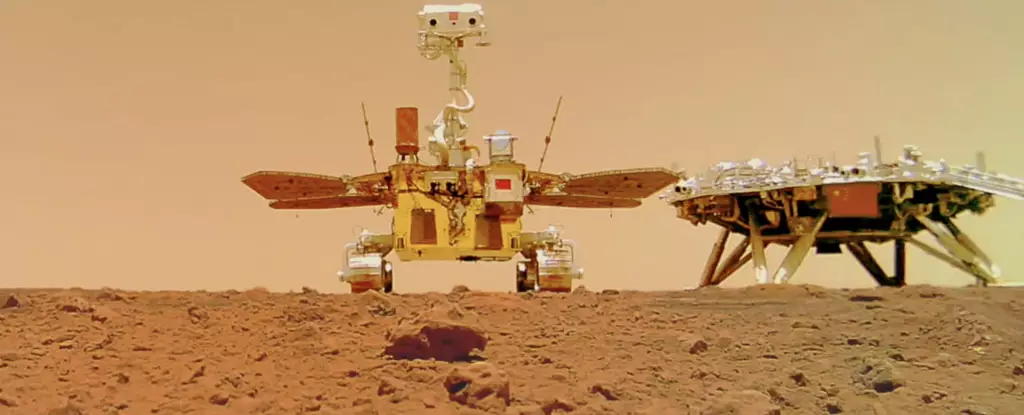Recent findings from China’s Zhurong rover have ignited discussions about the possibility that Mars once harbored a vast ocean, reshaping our understanding of the planet’s geological history. The rover, which successfully landed in the Utopia region of Mars in 2021, has contributed to the ongoing debate regarding the existence of ancient bodies of water on the Red Planet. While some researchers hail these findings as significant evidence, others remain skeptical, urging caution due to the complex history of Martian environmental conditions.
The Zhurong rover’s mission has involved meticulous analysis of Martian terrain features that suggest the presence of a former ocean. Lead researcher Bo Wu has reported observable formations, such as pitted cones, polygonal troughs, and etched flows around the rover’s landing site. These geological traits could hint at a watery environment, with the pitted cones thought to be remnants of mud volcano activity—a process closely associated with the interaction of water and sediment.
According to the team’s analysis, the proposed Martian ocean is theorized to have existed around 3.7 billion years ago, possibly the result of significant flooding. The concept involves a process where this hypothetical ocean gradually froze, eventually retreating and leaving behind telltale geological signatures, including a discernible coastline. While the study offers compelling insights, Bo Wu emphasizes that the findings do not constitute definitive proof of an ocean, highlighting the need for further exploration and potential sample return missions to strengthen their case.
Despite the enthusiasm surrounding these discoveries, skepticism persists in the scientific community. Notably, researchers like Benjamin Cardenas express concerns regarding the durability of the projected shoreline against the forces of nature across billions of years. Cardenas, from Pennsylvania State University, points to the erosive power of Mars’ winds and understated geological activity that could obscure or obliterate sedimentary evidence of a past ocean.
The debate hinges on the complexity of Martian geology which has been subject to both erosion and meteor impacts. Cardenas argues that even low rates of Martian erosion over aeons would significantly diminish the visibility of historical coastlines. This skepticism raises crucial questions about the viability of interpreting Martian surfaces and the extent to which they can reveal past environmental conditions.
Understanding the Implications of Martian Water
Establishing whether an ocean once existed on Mars is not merely an academic exercise; it has profound implications for our understanding of life beyond Earth. The origins of life on our planet are frequently linked to aquatic environments, such as oceans or tidal pools, where essential minerals and elements combined to create suitable conditions for life.
The possibility that Mars might have hosted similar aquatic environments could alter scientists’ perspectives on the habitability of other celestial bodies. If both Earth and Mars shared comparable geological pasts, it may suggest that life, in its various forms, could potentially arise elsewhere in our solar system, enhancing the search for extraterrestrial organisms.
The ongoing investigation by the Zhurong rover is a testament to humanity’s long-standing curiosity regarding our neighboring planet. While evidence collected thus far offers insights into the ancient landscape of Mars, much work remains in untangling the story of its watery past. The mixed reception among researchers underscores a broader understanding in science—that theories are constantly tested and refined through exploration and inquiry.
As we continue to probe the secrets of Mars, these discoveries may eventually merge into a narrative that not only clarifies Mars’ geological history but also enriches our understanding of life beyond Earth. Thus, the inspiration derived from Martian exploration illustrates the profound connection between geological inquiry and the quest to discover life in our universe.


Leave a Reply